
In colonial Virginia, those that followed religions other than the Church of England were considered dissenters.”
- Subject:
- Social Science
- Social Studies
- Material Type:
- Activity/Lab
- Provider:
- Colonial Williamsburg
- Date Added:
- 09/13/2022
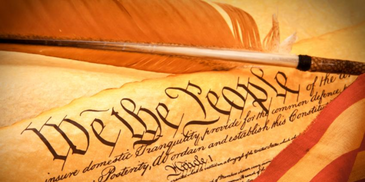

In colonial Virginia, those that followed religions other than the Church of England were considered dissenters.”
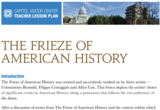
What historic events are featured in the Frieze of American History? How do these moments reflect both the history of our nation and the time within which they were selected to be included in the Frieze?

General George Washington held a rally to launch his 2016 campaign to promote participation in the democratic process. Follow along at itstartshere2016.org
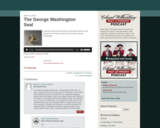
Since 2005, the "Past and Present" podcast from Colonial Williamsburg has taken you behind the scenes to meet interpreters, chefs, tradesmen, musicians, historians, curators, and more. We offer two versions of our podcast: one that's audio-only and one that includes a slideshow. In this episode: A pocket-sized ornament gives monumental insight into the private life of America’s best-known General: George Washington.
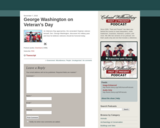
Since 2005, the "Past and Present" podcast from Colonial Williamsburg has taken you behind the scenes to meet interpreters, chefs, tradesmen, musicians, historians, curators, and more. We offer two versions of our podcast: one that's audio-only and one that includes a slideshow. In this episode, as Veterans Day approaches, the venerated Virginian veteran himself, Gen. George Washington, discusses his military past and how he believes veterans should be honored today.
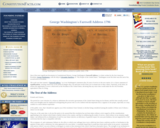
One of the most significant documents in Constitutional History, George Washington's Farewell Address, is a letter written by the first American President, George Washington, with the help of Alexander Hamilton, to "The People of the United States." Washington wrote the letter near the end of his second term as President.

The purpose of this lesson is to engage students in a discussion of the Constitutional Convention. Students will explore the key disputes that arose during the Convention, including how power would be divided between the federal and state governments and the various branches of government. Furthermore, students with understand the importance of compromise during the Constitutional Convention. They will synthesize various sources explored debate and compromise and the Convention to understand the idea of civic discourse--discussion rooted in mutual respect for differences and a desire for understanding--in the United States.
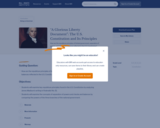
How are the republican principles of limited government, separation of powers, and checks and balances reflected in the U.S. Constitution?

Thomas Jefferson explains the importance of the Bill of Rights.
Colonial Williamsburg's Center for Teaching, Learning, and Leadership provides American history and civics materials nationwide. For more great videos, lesson plans, interactive games and more, create a free account on the Colonial Williamsburg Education Resource Library: resourcelibrary.history.org.
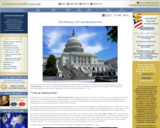
Citizens of the United States have celebrated Independence Day and Presidents' Day since the 1870s, and in 2005, the nation began to celebrate Constitution Day. Also know as Citizenship Day, Constitution Day is an American holiday honoring the day 39 delegates to the Constitutional Convention signed the United States Constitution. This historic date was September 17, 1787.
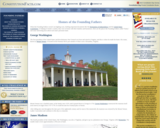
When the Founding Fathers weren't out fighting wars, drafting important documents like the Declaration of Independence and the United States Constitution, or helping to found a country, they were at home with their families and businesses. Here are the places the Founding Fathers called "home," and some interesting facts about each man's personal estate.

55 min
This lesson addresses the virtue of justice, which requires that rules are applied and enforced equally for everyone. Students will analyze the virtue of justice by evaluating a letter from Jourdon Anderson to his former slave owner. They will consider how Jourdon received justice for himself and for his family and how they can seek justice on behalf of themselves and other people.

This lesson on the Electoral College is part of Gilder Lehrman’s series of Common Core State Standards–based teaching resources. These resources were written to enable students to understand, summarize, and analyze original texts and secondary sources of historical significance. Students will demonstrate this knowledge by answering questions that seek to measure their conceptual understanding of the topic as well as engaging them in thoughtful discussions. Students are required to express themselves in writing. Students are asked to not only explain, but make fact-based arguments based on textual evidence.

Learn about the women who carved a path for future female advocates, judges, and Supreme Court Justices.

David Armitage, Lloyd C. Blankfein Professor of History at Harvard University, briefly explores some less obvious aspects of the Declaration of Independence, while also pointing to some of the later declarations heavily influenced by the American document.
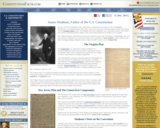
In May, 1787 the 55 Delegates to the United States Constitutional Convention set off to Philadelphia, Pennsylvania. Traveling in the late 18th century wasn't easy, and what would take modern Americans just hours took the Founding Fathers weeks. The Delegates from New Hampshire were particularly unlucky, and wouldn't arrive at the Convention until the middle of July, after it had already been in session for two months!

The United States Constitution continues to be America's guiding document. Join James Madison as he explores the Constitution and his hopes for the future of the country.

Join Thomas Jefferson on July 2, 1776, as he discusses the impending Declaration of Independence, and the promises made by that work. Will his dreams be fulfilled? And what will the legacy be of the document?
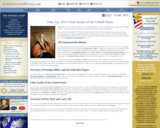
John Jay was a man of great achievement. During his lifetime he was a Founding Father, Signer of the Treaty of Paris, Second Governor of New York, and First Chief Justice of the United States.
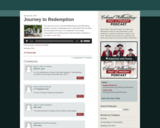
Since 2005, the "Past and Present" podcast from Colonial Williamsburg has taken you behind the scenes to meet interpreters, chefs, tradesmen, musicians, historians, curators, and more. We offer two versions of our podcast: one that's audio-only and one that includes a slideshow. In this episode, the cast and crew of Colonial Williamsburg’s groundbreaking program Journey to Redemption join to talk about how the piece was developed and why it’s so important to be having conversations surrounding racism and the history of slavery in our nation.